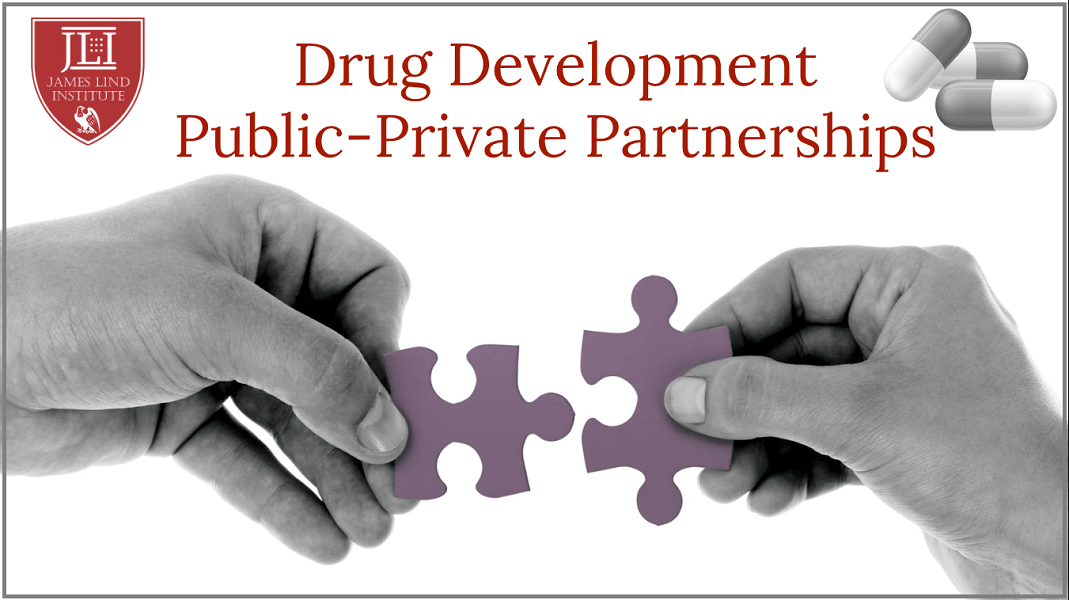Collaboration between experts from academia, industrial enterprises, patient groups and regulators aim to develop technological tools to boost innovative research in healthcare by speeding up the development of effective and safe drugs for patients.
Public-Private Partnerships for Drug Development
Public Private Partnerships are collaborations among multiple stakeholders designed to improve research efficacy with focus in biomedical or pharmaceutical field. The trans-disciplinary scientific research for potential treatment modality driven by fully integrated development and discovery with knowledge and expertise from pharmaceutical companies, academic parties and other stakeholders converge in collaborative partnerships. This includes players in academic or industrial stakeholders, governmental or non-governmental organisations, health foundations, patient groups and national competent authorities or regulatory scientists. This involves durable cooperation between public and private sectors to jointly share risks, costs and resources in developing products or services. This collaboration for biomedical or pharmaceutical research and development includes contract research consultancy and research agreements with an option to license drugs and technologies to generate common ground where universities, governmental bodies, patient groups, health foundations and private sector can combine expertise and resources.
Product Development partnership develops pharmaceutical solutions to address the global prosperity gap among low and middle income countries with an alternative business model. Precompetitive partnership generates novel scientific concepts and infrastructures based on mutual trust through effective collaboration by pooling of complementary expertise, knowledge and sharing rewards between multiple public and private entities. Such partnerships aim to improve access to specific treatment modality to alleviate the burden of diseases in middle and low income countries and overcome obstacles in the treatment or drug administration and distribution system. Interesting initiatives developed to increase patient access to affordable and high quality biosimilars or biologics in low and middle income countries is a joint development by a consortium of stakeholders. Positive outcome include providing databases and infrastructures to facilitate the discovery of novel targets and leads for various diseases; increasing basic understanding of novel models and standards for complex diseases; jointly designed training programs and capacity building; developing exchange platform for different perspectives related to regulatory science and system; ending potential disputes over issues of intellectual property by limiting activities to pre-competitive space.
Benefits in Drug Development
Private-public partnerships help face key challenges of drug discovery in understanding complex human diseases and mechanisms investigated followed by the selection and development of optimal drug molecules. This contributes to area of knowledge management and ensuring that intellectual property rights are fairly distributed between partners along with jointly addressing the grand challenges and obstacles within the field of pharmaceutical innovation by mutual interest to convert innovation into practice involving relevant groups such as regulators and patients. The collaborative approach of personalised medicine for patient satisfaction include improving the design of clinical trials and development of patient reported outcomes based upon patient stratification or use of electronic health records to ensure identification of better healthcare solutions.
Major collaborative advances in molecular biology, functional genetics and genomics has enhanced better scientific understanding of disease pathophysiology and increased knowledge base to fuel the development of new generation of innovative therapies impacting public health. There has been considerable increase in outputs of scientific literature, reviews highlights, patent applications, publications, animal models studies, training modules and open-source databases. The collaborative initiatives are delivering excellent results by impacting overall aspects of design of clinical trials, drug development procedure and understanding the biology of diseases for identification of potential efficacious and safe drugs. Thus ensuring socio-economic benefits, increase in global competitiveness and establishing attractive place for pharmaceutical research and development.
Online Course at JLI
James Lind Institute (JLI) provides online program like Post Graduate Diploma in Clinical Research with specializations in Pharmacovigilance, Medical Writing, Clinical Quality Assurance, Clinical Regulatory Affairs and Clinical Data Management for understanding all aspects of the interdisciplinary partnerships required by the drug development industry.
For more information please visit: www.jli.edu.in


